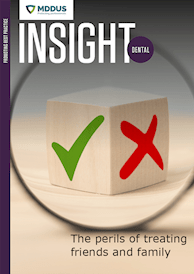WHEN it comes to issues around probity and acting with integrity, many dentists may feel that this area of regulation is unlikely to ever trouble them.
But in our experience at MDDUS, dentists who pride themselves on being open and honest at all times can sometimes fall foul of the rules.
Ask yourself: have you ever bumped into another car’s wing mirror but kept on driving because you were short of time? Have you ever “bigged up” your CV to improve your career prospects? Or perhaps when advertising services you provide, you have not described them in a clear or balanced way?
The General Dental Council’s Standards guidance states (principle 1.3) that you must “be honest and act with integrity”. This expectation applies to dentists’ professional and private lives and it is a matter that the regulator takes seriously.
Sliding scale
MDDUS has supported many members facing probity allegations across a broad spectrum of issues. We’ve often found that dentists who find themselves in this type of professional difficulty have acted with the best of intentions or have made questionable decisions while under extreme pressure – perhaps from challenging colleagues or circumstances within their workplace or wider environment.
The circumstances surrounding any allegations relating to probity will be considered by the regulator, including where these actions may fall on a sliding scale. For example, was the alleged behaviour a minor one-off incident or were there repeated, deliberate acts of dishonesty for personal gain? Did the behaviour put patient safety at risk, or did it undermine public trust in the profession?
The GDC’s guidance is clear that dentists “must justify the trust that patients, the public and your colleagues place in you by always acting honestly and fairly in your dealings with them". Dentists must be prepared to justify their behaviour, even where they acted with “good intentions”.
Probity pitfalls
A minor bump? In the scenario above relating to the car wing mirror, at first glance this may not seem like something that could have a bearing on a dentist’s professional fitness to practise. But if a witness reports the incident to police there is a risk the dentist could face a criminal investigation and their integrity could be called into question.
Enhancing the CV. A dentist may be convinced they are skilled/experienced enough to carry out a certain role or to earn a promotion – so where is the harm in slightly “enhancing” the truth in their CV to improve their chances of success? The reality is that the GDC (and likely the potential employer) will view this as a serious matter, as this kind of behaviour calls into question an individual’s honesty and integrity.
Advertising services. When advertising a service you are providing to patients, it may be tempting to include attention-grabbing claims about potential results or benefits, or not being immediately clear about relevant costs or risks. Not only could this be viewed as dishonest and unprofessional, but it may also be harmful to patients if such adverts make it difficult for them to make informed treatment choices. Be sure to follow the GDC’s Guidance on advertising (PDF), which states: “Misleading claims can make it more difficult for patients to choose a dental professional or dental service and can raise expectations which cannot be fulfilled. In more serious cases, they can put patients at risk of harm from an inappropriate choice.”
Cutting corners. Dental teams face extraordinary workloads with lengthy backlogs, and there may be pressure from colleagues to “cut corners” to save time. Examples might include health and safety assessment checklists being ticked without the proper steps being carried out. Or signing a form in a colleague’s name because you are confident they would do so if they just had the time to read it. However, if one of these shortcuts resulted in patient harm or other negative outcome, then it is likely that the dentist responsible for that shortcut would face questions over their probity. Dentists who are experiencing pressure to behave in a way that they believe could risk patient safety should always follow the GDC guidance on raising concerns. You can also find practical advice in this MDDUS article on tackling the backlog.
Deliberate acts. There are of course more deliberate acts of dishonesty that have led to GDC investigation. Some cases MDDUS has dealt with include: dentists retrospectively altering patient records to cover up an error; misrepresenting the number of hours worked for financial gain; and entering into an inappropriate romantic relationship with a patient. Other common pitfalls relate to dentists’ use of social media.
Self-reporting to the GDC. If you are subject to criminal proceedings (including a police caution) or a regulatory finding is made against you, anywhere in the world, GDC guidance (PDF) requires you to inform them without delay. Even if this relates to circumstances beyond your professional practice. Incidents that occur in your personal life leading to a caution or conviction are of interest to the GDC to ensure this will not impact your fitness to practise or bring the profession into disrepute.
Key points
- Dentists facing allegations in relation to probity should contact MDDUS immediately for advice on how to respond.
- Dentists must be prepared to justify their behaviour and decision-making, both in their professional and private lives.
Be sure to comply with GDC guidance, particularly in relation to:
- conflicts of interest
- using social media (PDF)
- prescribing medicines (for yourself or others) (PDF)
- duty of candour
- advertising services (PDF)
This page was correct at the time of publication. Any guidance is intended as general guidance for members only. If you are a member and need specific advice relating to your own circumstances, please contact one of our advisers.
Read more from this issue of Insight Dental






